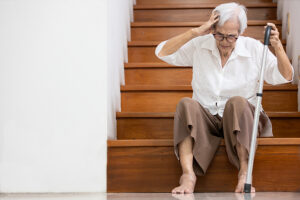Companion Care at Home – Understanding Vertigo in Seniors
 Vertigo is a familiar symptom that can happen to anyone, even seniors. It feels like spinning or whirling, often followed by dizziness, imbalance, and a sense of loss. Its increased impact on seniors might be due to changes in the body’s processes that come with aging. Seniors with companion care at home can receive support during bouts of vertigo as well as monitor for triggers to ensure they are safe. This support begins with understanding how vertigo affects seniors.
Vertigo is a familiar symptom that can happen to anyone, even seniors. It feels like spinning or whirling, often followed by dizziness, imbalance, and a sense of loss. Its increased impact on seniors might be due to changes in the body’s processes that come with aging. Seniors with companion care at home can receive support during bouts of vertigo as well as monitor for triggers to ensure they are safe. This support begins with understanding how vertigo affects seniors.
Vertigo’s Impact on Seniors
Benign paroxysmal positional vertigo (BPPV) is one of seniors’ most common reasons for vertigo. BPPV happens when small calcium crystals in the inner ear move around and mess up how the vestibular system works. Vertigo can come on quickly in seniors when their head position changes, like when they roll over in bed or look up.
Another cause of dizziness in seniors is Meniere’s disease, which affects the inner ear. Meniere’s disease is marked by repeated bouts of dizziness, hearing loss, ear ringing, and a full feeling in the affected ear. It is thought to be caused by a fluid buildup in the inner ear, but no one knows for certain.
Last but not least, vertigo in seniors can also be caused by problems with circulation. Vertigo and dizziness can happen when there is less blood flow to the brain. This can be caused by diseases like atherosclerosis or low blood pressure. Also, some popular medications for seniors, like those for high blood pressure or heart problems, can cause side effects like dizziness or feeling like they will pass out.
Can Vertigo Impact Seniors’ Day-to-Day Functioning?
Vertigo can make a big difference in the quality of life of seniors. The fear of falling and losing balance can make them less active and pull away from other people. Seniors may need help with more of their daily tasks, which can frustrate them and reduce their sense of freedom. With the support and gentle care of companion care at home, they gain help with these tasks.
Vertigo Treatment Options
Many cases of dizziness in seniors can be treated, which is good news. Depending on the root cause, possible treatments include:
Canalith repositioning maneuvers: These are specific head and body movements that can help reposition the loose calcium crystals in the inner ear, relieving the symptoms of BPPV. Medical professionals can help seniors understand these movements as loved ones and companion care at home encourage them to try them regularly.
Medication: Some medications, like vestibular suppressants or anti-nausea drugs, may be given to treat the signs of vertigo.
Lifestyle changes: Seniors can benefit from changing their daily lives, such as being careful when changing positions, avoiding sudden head movements, and using gadgets to help them stay steady.
Balance training: Balance training routines and vestibular rehabilitation programs can also help seniors improve their balance and reduce their vertigo attacks severity.
Treating underlying conditions: If vertigo is caused by an underlying health problem, like Meniere’s disease or circulation problems, treating the main problem can help ease the symptoms. Seniors with vertigo need to talk to their doctor for a correct diagnosis and treatment. With the right care and support from loved ones and companion care at home, many seniors can eliminate their vertigo and recover their confidence in daily tasks.
If you or an aging loved one are considering hiring companion care at home in Pasadena, CA, please contact the caring staff at Home Care Help. Serving All of Los Angeles County. Call Us Today at (888) 989-7388.
Source 1 / Source 2 / Source 3
- What are the Mental Benefits of Companion Care at Home for Seniors? - April 18, 2024
- Common Fears the Elderly Might Have and How In-Home Care Can Help - April 3, 2024
- Assessing Aging: Tests for Seniors to Track Well-Being - March 21, 2024
